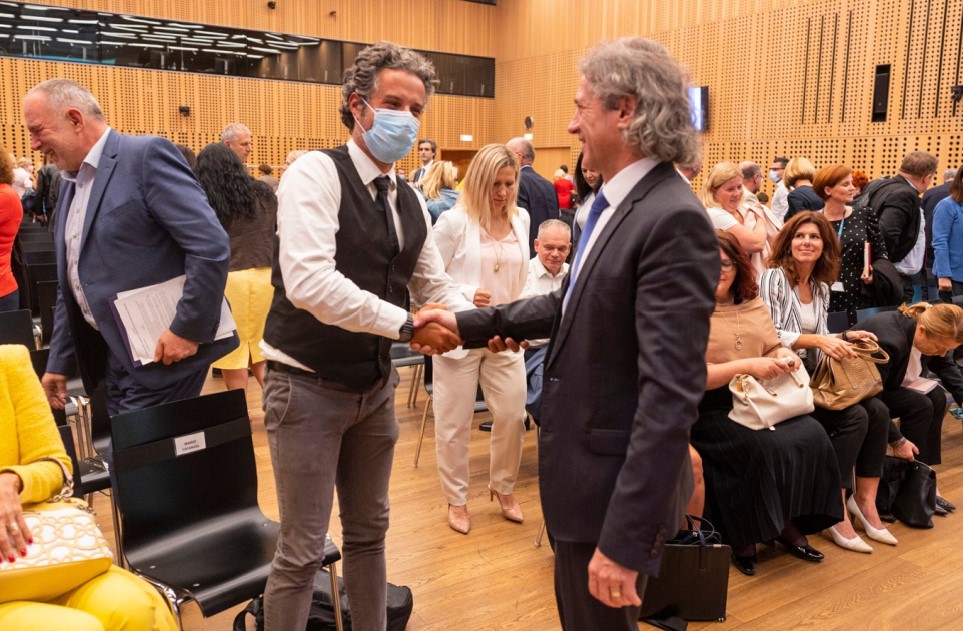By: Sara Bertoncelj / Nova24tv
“The state of epidemiology is the same as the state of the management of the epidemic,” said Dr Milan Krek, the former Director of the National Institute of Public Health. And it is also the same as the governance of the country, one might add. As we have already written, the 14-day incidence of coronavirus in Slovenia is the highest in Europe, with 957 confirmed cases per 100,000 inhabitants in the last 14 days. Prime Minister Robert Golob has surprisingly not declared this result as one of the successes of the first 100 days of the current government.
Dr Milan Krek, former Director of the National Institute of Public Health, believes that the epidemiological situation in our country is a direct reflection of the current management of the epidemic. Just by checking the measures that the Advisory Group has recommended to the citizens – if there even are any – we can quickly figure out the answer. The Advisory Group did slightly modify its recommendations on vaccination and the wearing of masks at the beginning of September, though. They now recommend that everyone whose work allows them to do so should work from home, especially if they belong to one of the vulnerable groups of the population or if they are over 60 years of age. In addition, students or their parents can pick up coronavirus self-testing kits at the pharmacies. But all of these are just recommendations, as the government has not adopted any decree yet. And we all know the extent to which recommendations work in our country.
“We used to meet with the Prime Minister once a week during the term of the government of Janez Janša,” Dr Krek also pointed out, who was often the target of attacks at the time. During the previous government’s term, the Advisory Group discussed each measure with the Prime Minister, which is not happening now. So far, Prime Minister Robert Golob has only advised that people “fight covid” with seawater and sunshine, and Dr Mario Fafangel has not disputed him “professionally” at all. The previous government held regular press conferences and kept the public informed about what was going on – but was often scolded for this and even accused of deliberately intimidating the public. However, the Golob government seems to have taken a completely different approach – that is to say, they talk about it as little as possible. If they had their way, we would probably not even know that we are currently in first place in Europe in terms of the number of cases per 100,000 inhabitants. And if in the previous government’s term, they gave out information for political reasons, the current government is not giving out information because of the exact same reasons. It is worth keeping in mind, too, that while Golob promised that there would never be another lockdown, on the other hand, he is already announcing an economic lockdown. Perhaps it is because of different reasons, but we all know where that would lead us. The previous government, even during the worst parts of the epidemic, did everything it could to ensure that the economy did not have to be shut down. Now, obviously, things will be different.
A no-measures situation will have its consequences
We may be facing a milder form of the virus this autumn and winter, but this also means – especially in the absence of any measures – a more rapid and wider spread of the virus and a consequently higher level of economic impact. Parents will have to stay at home with their children, and other people will have to stay at home on sick leave. The fact that self-testing does not work has already been proven in the past. And with the current price increases and inflation, it is clear that parents will no longer even be able to afford to keep their children at home. The economy will therefore be affected even without closures. People have come back from their holidays, there is more and more socialising happening in September – which will undoubtedly be reflected in a higher number of new infections in the coming days, as the measures have not been adapted yet. The number of positive tests on Sunday was already high, although we know already that fewer people get tested over the weekend. And last but not least, people are dancing, since now is the time of freedom – and some people who are wearing masks in stores have even been threatened by others, who said that they would beat them up. Unfortunately, Dr Krek had a similar experience.
“Go back to orthopaedics, Minister, and try to operate without the influence of politics. Get out as soon as you can, before you cause us any more problems, we already have enough to spare, so you can stop causing even more problems and weakening an already (in my opinion) bad system by passing laws and regulations of this and that type. Please, can you finally begin to understand that you are dealing with a complex system that needs to be solved through agreements, dialogue, empathy and respect for human life, and not through crude interventions, which are clearly your preferred method of work, and with which you are complicating the situation in healthcare even further,” Dr Krek wrote in his column on the web portal Portalplus.si, where he also pointed out that the Ministry of Health is the weakest point of the Slovenian healthcare system. He also pointed to the fact that it took the Minister only three months to rank us among the so-called third-world countries in terms of the state of our healthcare system and measures. It is true that the current government has achieved some results – but unfortunately, in the opposite direction to that which we wanted.

